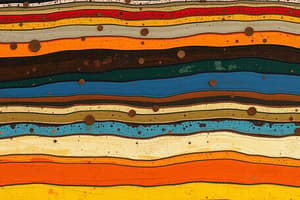Podcast
Questions and Answers
What type of earthworm is an epi-endogeic species?
What type of earthworm is an epi-endogeic species?
- Nightcrawler
- Red earthworm (correct)
- Earth feeder
- Peregrine soil dweller
Which type of decomposition process occurs after about ⅔ of organic carbon is left?
Which type of decomposition process occurs after about ⅔ of organic carbon is left?
- Slow stage decomposition (correct)
- Aerobic decomposition
- Facultative anaerobic decomposition
- Fast stage decomposition
Which factor is NOT mentioned as affecting the rate of decomposition?
Which factor is NOT mentioned as affecting the rate of decomposition?
- Moisture content
- Substrate composition
- Soil pH (correct)
- Temperature
What role do fungi and actinomycetes play in microbial conversion?
What role do fungi and actinomycetes play in microbial conversion?
What is the primary purpose of leaching in soil processes?
What is the primary purpose of leaching in soil processes?
Which type of anaerobe may require oxygen to survive?
Which type of anaerobe may require oxygen to survive?
Which statement best describes heterotrophic bacteria?
Which statement best describes heterotrophic bacteria?
Which of the following best describes fragmentation in the decomposition process?
Which of the following best describes fragmentation in the decomposition process?
What is the primary purpose of decomposition models mentioned?
What is the primary purpose of decomposition models mentioned?
What is the role of saprophytic fungi in decomposition?
What is the role of saprophytic fungi in decomposition?
Which layer of soil is primarily affected by airborne ascomycetes?
Which layer of soil is primarily affected by airborne ascomycetes?
Which of the following is NOT a type of earthworm classified under the given categories?
Which of the following is NOT a type of earthworm classified under the given categories?
What results from the action of earthworms in soil?
What results from the action of earthworms in soil?
What role does condensation/humidification play in soil composition?
What role does condensation/humidification play in soil composition?
Which organisms are primarily responsible for breaking down hemicellulose and cellulose?
Which organisms are primarily responsible for breaking down hemicellulose and cellulose?
What are the effects of higher molecular weight carbon compounds on soil?
What are the effects of higher molecular weight carbon compounds on soil?
Which layer in the decomposition process is characterized by the presence of Penicillium and Trichoderma?
Which layer in the decomposition process is characterized by the presence of Penicillium and Trichoderma?
What is the outcome of pathogen invasion on leaves or needles that remain on the tree?
What is the outcome of pathogen invasion on leaves or needles that remain on the tree?
What is one of the primary functions of tree roots in relation to soil?
What is one of the primary functions of tree roots in relation to soil?
How do fine roots contribute to organic matter (OM) concentration compared to leaf litter production?
How do fine roots contribute to organic matter (OM) concentration compared to leaf litter production?
Which statement reflects the nutrient uptake and recycling role of trees?
Which statement reflects the nutrient uptake and recycling role of trees?
What is a key factor that enhances the stability of soil slopes?
What is a key factor that enhances the stability of soil slopes?
What does the term 'nutrient pumping theory' refer to?
What does the term 'nutrient pumping theory' refer to?
In areas of poor fertility, what percentage of total production is attributed to fine roots?
In areas of poor fertility, what percentage of total production is attributed to fine roots?
What is the primary characteristic of podzolization?
What is the primary characteristic of podzolization?
What role does humus play as a binding agent in soil stability?
What role does humus play as a binding agent in soil stability?
What does leaching refer to in soil science?
What does leaching refer to in soil science?
Which horizon is characterized by maximum illuviation?
Which horizon is characterized by maximum illuviation?
Which of the following best describes the function of roots in soil morphology?
Which of the following best describes the function of roots in soil morphology?
Which process leads to the formation of an oxic horizon?
Which process leads to the formation of an oxic horizon?
What does melanization refer to in soil processes?
What does melanization refer to in soil processes?
What is salinization?
What is salinization?
What is the primary effect of decalcification in soil?
What is the primary effect of decalcification in soil?
What characterizes the E horizon in soil profiles?
What characterizes the E horizon in soil profiles?
Which soil order is typically associated with high organic matter content?
Which soil order is typically associated with high organic matter content?
Which process involves the churning of soil materials by biological or physical means?
Which process involves the churning of soil materials by biological or physical means?
What is desalinization in soil science?
What is desalinization in soil science?
Which soil order is typically found in desert regions?
Which soil order is typically found in desert regions?
Which process describes the reduction of iron in anaerobic soils?
Which process describes the reduction of iron in anaerobic soils?
Which soil order is characterized by high clay content and poor drainage?
Which soil order is characterized by high clay content and poor drainage?
What is a primary function of fine roots in plants?
What is a primary function of fine roots in plants?
What type of root structure is characterized by numerous laterals that extend down from the base of the stump?
What type of root structure is characterized by numerous laterals that extend down from the base of the stump?
Which of the following statements accurately describes mycorrhizae?
Which of the following statements accurately describes mycorrhizae?
How is the depth of the rooting system generally characterized?
How is the depth of the rooting system generally characterized?
What type of mycorrhiza penetrates the root cortex of plants?
What type of mycorrhiza penetrates the root cortex of plants?
What effect can potting medium rich in phosphorus have on plant growth related to mycorrhizal roots?
What effect can potting medium rich in phosphorus have on plant growth related to mycorrhizal roots?
Which root form is described by having a strong, developed tap root along with lateral roots near the root collar?
Which root form is described by having a strong, developed tap root along with lateral roots near the root collar?
What is one of the main components of the mycorrhizal relationship that benefits plants?
What is one of the main components of the mycorrhizal relationship that benefits plants?
What factor can significantly influence the competition among tree roots?
What factor can significantly influence the competition among tree roots?
What is the characteristic of ectomycorrhizae?
What is the characteristic of ectomycorrhizae?
Flashcards are hidden until you start studying
Study Notes
OM Accumulation
- Leaching: Removal of materials in solution from the soil by percolating water
- Calcification: Accumulation of carbonates, usually in desert areas, leaving a white powdery appearance
- Decalcification: The eluviation of carbonates
- Salinization: Accumulation of salts
- Desalinization: Leaching of soluble salts
- Alkalization: Accumulation of sodium
- Dealkalization: Removal of sodium
- Melanization: Darkening of light-colored minerals by the admixture of organic matter
- Leucinization: Paling of soil horizons due to the disappearance of dark organic materials
- Gleization: Reduction of iron under anaerobic, waterlogged conditions, with the production of bluish-greenish gray matrix color
- Pedoturbation: Biological and/or physical churning and cycling of soil materials
- Podzolization: Translocation of organic materials and sesquioxides from the upper soil horizon to the B horizon, creating a spodic horizon
- Desilication (Laterization): Removal of silica leading to the concentration of iron as ferric oxides under oxidizing conditions, forming laterite, an iron-rich subsoil layer in highly weathered humid tropical soils
Soil Orders
- Entisol: Young soils with little development
- Inceptisol: Slightly developed soils
- Alfisol: Moderately weathered soils with a good balance of nutrients
- Ultisol: Highly weathered soils with low fertility
- Oxisols: Extremely weathered soils found in tropical climates
- Spodosol: Soils with a spodic horizon, formed by podzolization
- Histosol: Soils with a high organic matter content (at least 20% mineral matter)
- Mollisols: Soils with a thick, dark topsoil, found in grasslands
- Vertisol: Swelling and shrinking clay soils, often found in rice fields
- Andisols: Soils formed from volcanic ash
- Aridisols: Desert soils with low fertility, typically dry
- Gelisols: Soils found in permafrost regions
Hans Jenny Equation: Soil = f(Cl O R P T)
- Forest vegetation and soil covary
- Global level: Influenced by climate
- Regional and local level: Influenced by parent material and topography
- Investigated with aerial photograph (stereoscope)
Boreal Forest
- High latitude, northern hemisphere
- Upper elevations of mountains
- Dominated by species from Genera Picea, Abies, and Pinus, with hardwood species of Populus, Betula and Alnus
Mineral Soil
- Decomposed by actinomycetes (break down cellulose and resistant materials)
- Leaching: Movement/removal of water-soluble sugars, polyphenols, and organic acids, resulting in increased palatability
- Fragmentation: Converting OM to smaller pieces by soil fauna, increasing surface area for bacteria and fungi colonization, speeding up decomposition
Forest Floor Decomposition
- Complex web of interactions among soil fauna and microorganisms
- Stages:
- Pathogen invasion: Occurs while leaves/needles are still on the tree, disrupting cell integrity
- Microbial conversion: Cellulose and carbohydrates are converted to CO2 and H2O, involving bacteria (heterotrophic, autotrophic, aerobic, anaerobic) and fungi (actinomycetes)
- Condensation/humidification: Concentration of resistant organics, leading to high molecular weight carbon compounds, affecting soil physical, chemical, and biological properties, thereby forming humus
Factors Affecting Rate of Decomposition
- Substrate: High amounts of lignin and polyphenols = slow rate
- Temperature: Affects organism activity
- Moisture content: Affects organism activity through aeration and moisture supply
Tree Roots and their Significance
- Interface between soil and plants
- Influence soil properties
- Alter morphology and micromorphology
- Stabilize soil/slope: Prevent landslides and provide support
- Microtopography: Creates root disks, affecting soil morphology
- Concentration of OM: Annual production of fine roots exceeds leaf litter production
- Nutrient uptake and recycling: The nutrient pumping theory
- Formation of large continuous macropores: Increasing infiltration and soil by-pass contact
- Weathering: Accelerated decomposition through root exudates
Characterizing Root System
- Depth of rooting system: Typically shallow, uncommon to penetrate below 0.2 m depth
- Components of root system:
- Structural roots: Large roots for stability and support
- Fine roots: 1-2 mm in diameter, responsible for water and nutrient uptake
- Allometric Equation: Shows a general relationship between weight of individual tree components or between above and belowground biomass
- Interaction of tree roots and other plants: Competition for water, nutrients, light, and space
Mycorrhiza
- Symbiotic association between specific root-inhabiting fungi and fine feeder roots of plants
- Types: Ectomycorrhizae, Endomycorrhizae
- Naming: Based on the host plant
Benefits of Mycorrhizae to Plants
- Increase absorptive surface of roots
- Increase tolerance to stress (water, nutrients, disease)
- Increase access to unavailable ions (bound P)
- Deter infection by other fungi
- Increase access to organic N sources
- May negatively affect growth when soil is high in P
Benefits of Mycorrhizae to Fungi:
- Most must form mycorrhizal association to complete their life cycle
- Depend on photosynthate (carbohydrates and some vitamins) from plant host
Factors Affecting Mycorrhizal Development:
- Soil type, pH, chemical composition
- Climate, temperature, and moisture
- Plant species and their genetic diversity
Studying That Suits You
Use AI to generate personalized quizzes and flashcards to suit your learning preferences.




